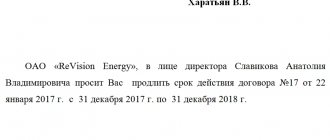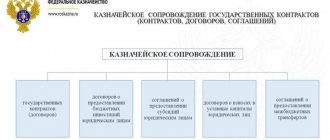Home / Government procurement / Federal Law 44
Back
Published: 05/11/2019
Reading time: 7 min
0
857
Changing the terms of a government contract under 44-FZ means making adjustments to the agreement between the customer and the contractor. The law allows changes to the essential and non-essential terms of the contract, but only in exceptional situations.
- In what cases is it allowed
- Is it possible to change the essential terms of the contract?
- The procedure for changing conditions at the conclusion stage
- The procedure for changing conditions at the stage of contract execution
- When should changes to the contract be made publicly available?
Content:
1. What conditions are essential 2. Changes in essential conditions 3. How to change a government contract for construction work? 4. How to change the VAT rate in a contract? 5. How to improve the subject of the contract? 6. When can essential terms not be changed? 7. Changing non-essential terms of the contract under 44-FZ 7.1 How to change a contract at the conclusion stage? 7.2 How to change a contract at the execution stage? 8 Changes in the terms of contractual obligations due to COVID-19
What conditions are essential?
Essential terms are provisions that are mandatory for the contract and expressly specified in the law.
According to paragraph 1 of Article 432 of the Civil Code, a contract cannot be concluded without mutual agreement of the parties regarding the subject of obligations and conditions that are defined by law or other legal acts as essential or necessary for contracts of this type, and all those conditions on which agreement must be reached at the request of one of the parties.
The text of the contract must include the following conditions (Part 13, Article 34 of 44-FZ):
- methods for determining the volume of goods, works or services (GWS) based on customer requests when purchasing with an indefinite quantity;
- the amount of the deal;
- total cost for each stage;
- responsibility of the customer and the contractor;
- procedure and terms for payment of technical and technical equipment;
- procedure and deadline for acceptance of industrial and technical installations and registration of such acceptance;
- reducing the amount of payment by the amount of mandatory payments (including taxes, fees) associated with the payment of obligations, if they must be paid by the customer to the budgets of the budget system;
- contract performance security (OIC) and terms of its return, which was paid in money;
- the procedure and period for the provision by the contractor of guarantee obligations (if such a requirement is established);
- provision of a new OIC if the bank that issued the bank guarantee as an OIC has its license revoked;
- source of financing.
In 2021, customers who receive funds from the federal budget, in the cases specified in 459-FZ of November 29, 2018, must include in the contract a clause on treasury support of target funds, and in some cases, on treasury security of obligations.
Change of material conditions
As a general rule, it is prohibited to change essential conditions. However, Part 1 of Article 95 and Part 54 of Article 112 of 44-FZ indicate the grounds on which this rule can be violated.
| Reasons | Conditions | NPA |
| The price decreases, but the volume of industrial goods remains unchanged. | Reflected in the documentation and contract or only in the contract if the purchase is carried out from a single supplier (SU). | clause “a” clause 1 part 1 article 95 44-FZ |
| At the customer’s suggestion, the volumes of industrial and industrial materials are increased or decreased, and the contract amount changes proportionally. | The price decreases or increases within 10% in both directions. The opportunity is indicated in the documentation and the contract or only in the contract if the purchase is from the EP. Changing the contract under 44-FZ on this basis does not give the parties the right to supplement the specification with new clauses or remove from it already approved ones. | p.p. “b” clause 1 part 1 article 95 44-FZ |
| Conditions change due to circumstances beyond the control of the parties, and it is not possible to continue to fulfill obligations. | The contract is concluded for a period of at least 3 years. Its cost is equal to or exceeds the amount of cost indicated in clause 1 of Government Decree No. 1186 of December 19, 2013 to ensure: · federal needs - 10 billion rubles; · regional needs - 1 billion rubles; · local needs – 0.5 billion rubles. For procurement of clinical trials of medicines for medical purposes, the contract amount must be at least 40 million rubles. Amendments to the state contract occur by decision of the government, the highest executive body of the region or local administration, respectively. | Clause 2.3 Part 1 Article 95 44-FZ |
| Prices (tariffs) for GWS are changing. | These tariffs must be regulated by current legislation. | Clause 5 Part 1 Article 95 44-FZ |
| The limits on the customer's budget obligations are reduced. | The parties are preparing an additional agreement to amend the contract. This is how new terms of the contract are agreed upon, including price, deadlines for fulfilling obligations and volumes of industrial and industrial works. Changing the contract specification under 44-FZ to reduce the volume of obligations is carried out in accordance with the Methodology developed by Government Decree No. 1090 of November 28, 2013. | Clause 6 Part 1 Article 95 44-FZ |
| The amount of obligations concluded with a foreign organization for the treatment of a citizen of the Russian Federation abroad is changing. | The contract amount is reduced or increased according to medical indications of the list of services that are related to treatment. It is important to provide for this possibility in the contract. | Clause 7 Part 1 Article 95 44-FZ |
| The contract with the sole supplier is changed. | Essential conditions can be changed if the contract was concluded on the basis of clauses 1, 8, 22, 23, 29, 32, 34, 51, part 1 of article 93 of 44-FZ. | Clause 10 Part 1 Article 95 44-FZ |
What conditions can and cannot be changed during the execution of the contract?
Many public procurement participants are interested in what can and cannot be changed when executing an already concluded contract. This issue will be discussed in this article.
The customer carried out a competitive procedure, determined the winner and signed a contract, but something does not go according to plan. For example, the supplier wants to bring another product or even tell the customer that the contract will be executed by another person.
How is it possible to change the quantity of goods, as well as its price under the contract?
The price and quantity of goods are essential terms of the contract, therefore, by agreement of the parties, they can be changed only in some cases. For example, the contract price can be reduced. This can be done without changing the quantity of goods, their quality and other terms of the contract. Here is the second option: you need to increase or decrease the quantity of goods by 15 percent, but no more. In this case, a proportional increase in the contract price is possible. In case of a decrease in the quantity of goods, the contract price is reduced based on the unit price of the goods. A change in the quantity of goods and a reduction in the contract price is possible provided that this is stipulated by the contract and indicated in the procurement documentation. If the purchase is carried out from a single supplier, such an opportunity should be specified in the terms of the contract.
It is worth considering the following points.
- Budgetary or government institutions that do not have limits so that the price can be increased do not have the right to increase the quantity of goods and its price under the contract by 15 percent.
- If a request for quotation is carried out, an increase in the contract price by 15 percent is not allowed, since a change in the contract price is possible only if it is stipulated in the procurement documentation. When requesting quotes, no documentation is generated (letter of the Ministry of Economic Development No. OG-D28-12811 dated October 2, 2015).
What should the customer do if the supplier delivers the wrong product that he specified in his application?
If the supplier offers a product that is not specified in the contract, the customer is not always obliged to refuse to accept it. If the delivered product turns out to be better than what was originally specified in the contract, then it can be accepted. During the execution of the contract, the law allows for improvements in quality characteristics. It is advisable to draw up an additional agreement to the contract, which should indicate on the basis of what specific characteristics the product is accepted as improved. This document will allow, in case of inspections, to avoid unnecessary questions to both the customer and the supplier. But remember that accepting goods with improved characteristics is the right, not the responsibility of the customer. However, if the supplier delivers a product that is completely different from that specified in the contract, the customer may refuse to accept it and begin the procedure for unilateral termination of the contract. And this threatens the supplier with being included in the RNP for a period of 2 years.
Is it possible to change the contractor in a contract?
The contractor cannot be changed in the contract, since it must be performed by the winner of the purchase. However, there is still one exception: if, while participating in the procurement, the winner underwent a reorganization. In this case, the winner has the right to assign the obligation to fulfill the contract to his legal successor. When the contractor assigns the right to demand payment, changes to the contract are not required. Only the recipient of the payment changes, but the executor of the contract remains the same.
Can someone other than the performer receive payment under the contract?
This situation is possible in a situation where the contract has been fully executed, but the customer has not yet paid for its implementation. When the contractor assigns the right to demand payment, changes to the contract are not required, but the procedure for notifying the customer about this must be followed. Only the recipient of the payment changes, but the executor of the contract remains the same.
Tags : change of conditions,
01 October 2017
Number of views: 2093
Please rate how useful this material was.
Rating: 0/5 — 0 votes
Similar articles:
- Regulations have been approved for checking delivered goods using both video and photographic equipment for compliance with the information under the contract (147)
- Court: in the public procurement notice you can indicate information in the form of a reference to documentation (132)
- FAS RF: when conducting a repeat procurement in the field of construction, the participant will only need to submit “consent” to participate (115)
Comments ()
Write a comment
How to change a government contract for construction work?
Since 07/01/2019, 44-FZ provides grounds for allowing changes in essential conditions in government contracts for construction, reconstruction, major repairs, demolition of a capital construction project, and work to preserve cultural heritage sites.
| What's changing | Conditions | NPA |
| Any essential conditions. | Subject to the following conditions: · the contract is concluded for at least 1 year; · cost of liabilities - not less than 100 million rubles. (clause 1(1) of Government Decree No. 1186 of December 19, 2013); · the work cannot be completed due to circumstances beyond the control of the parties; · the change will not lead to an increase in the execution time or amount by more than 30%. Essential terms can be changed after written justification. It is based on an act of the government, the highest executive body of the region or local administration. | Clause 8 Part 1 Article 95 of Law No. 44-FZ |
| Volume or types of work performed. | The price decreases or increases by 10% in both directions. The opportunity is reflected in the documentation and the contract or only in the contract if the purchase is carried out from the EP. | clause “c” clause 1 part 1 article 95 44-FZ |
| Duration of the contract. | Changes only once, the new period should not exceed the original period. Obligations cannot be fulfilled due to circumstances beyond the control of the parties or due to the fault of the performer. If the performer is at fault, then a fine (fines, penalties) is imposed on him, and he must provide the OIC for a new term. The validity period of the bank guarantee must be at least 1 month longer than the modified deadline for fulfilling obligations (Part 3 of Article 96 of 44-FZ). | Clause 9 Part 1 Article 95 44-FZ |
Is it possible to change the essential terms of the contract under 44-FZ

Law 44-FZ does not contain the possibility of changing such contract terms. But Article 95 of Law 44-FZ names situations in which a single principle may be violated when an agreement is reached between the parties to the agreement. Let us make a reservation that amendments are permissible if the customer has indicated in advance a similar scenario in the documentation.
The following conditions are subject to change:
- the price of the contract, subject to the consent of the parties, maintaining the volume and quality of the technical and technical requirements and the absence of amendments to other provisions;
- the cost of the contract when the volume of GWS provided is adjusted by a maximum of 10%;
- the price of the agreement, provided that the regulated payment tariffs for gas, electricity, water, and heat supply have increased/fell;
- cost, volume of technical and technical equipment, terms of provision of services, if the limits allocated to the government agency for procurement activities are reduced;
- the price of the contract after adjusting the list of services, when it comes to the provision of medical services to a Russian outside the country;
- volume of GWS in the amount within the difference between the price of the winning bidder and the NMCC, if such a possibility was indicated in the procurement documentation;
- quality, technical characteristics, functionality of the product, provided that these indicators will be changed for the better.
Important! The mentioned changes to the terms of the contract under 44-FZ are not allowed at the stage of signing the papers. To correct the contract on one of these points, you must sign an additional agreement.
How to change the VAT rate in a contract?
The VAT rate increased from 18% to 20% from 01/01/2019. In this regard, 44-FZ added another basis for changing essential conditions. Adjustment of the terms of the draft contract under 44-FZ due to a change in the VAT rate occurs on the basis of Part 54 of Article 112 of 44-FZ.
Until 01.10.2019, by mutual agreement, the amount of the contract within the period of its execution is increased within the limits of the increased VAT rate if the following conditions are met:
- the contract was signed before 01/01/2019;
- the provisions of the agreement (including when justifying the NMCC) do not provide for an increased VAT rate from 01/01/2019;
- acceptance and payment of technical and technical equipment is carried out after 01/01/2019.
Important point! From 01/01/2019, the new rate is applied to all contracts concluded before the VAT increase. The total amount does not change, and the tax increases at the expense of the supplier (Letter of the Ministry of Finance of the Russian Federation No. 24-03-07/61247 dated August 28, 2018). This requirement does not apply to contracts that are regulated by Government Decree No. 1186 of December 19, 2013.
How to improve the subject of the contract?
44-FZ allows the supply of other goods by agreement between the customer and the contractor, if the quality and characteristics of this product are better than those of the subject of the contract (Part 7, Article 95 44-FZ) states that by agreement of the parties, another product can be supplied.
Changing the contract amount or the price of a unit of goods and services in this case is not allowed.
Parties are not permitted to use this basis to change the country of origin of the goods. Such a prohibition must be determined by legal acts adopted within the framework of Parts 3 and 4 of Article 14 of 44-FZ on the national regime.
When can essential conditions not be changed?
It is not allowed to change the terms of the contract under clause 1, part 1, article 95 of 44-FZ, if it was concluded as part of a request for quotations (Letter of the Ministry of Finance of the Russian Federation dated 12/01/2017 No. 24-03-07/79960, dated 11/09/2017 No. 24-03-07/73936).
In the process of fulfilling obligations, the source of financing cannot be changed, since this is an essential criterion (Letter of the Ministry of Economic Development No. D28i-2286 dated 08/03/2015).
Also, the following provisions cannot be adjusted:
- Supplier (Part 5, Article 95 44-FZ). An exception is the reorganization of the supplier (legal entity) in the form of transformation, merger or accession. In this case, it is possible to replace the customer with the transfer of all rights and obligations to the new customer (Part 6 of Article 95 of 44-FZ).
- The deadline for delivery of goods and fulfillment of obligations, unless otherwise specified in the contract.
- Adjustment of the contract amount by more than 10%.
Essential terms of the contract under 44-FZ

Law 44-FZ does not establish which terms of the contract are considered essential - the necessary information can be found in Art. 432 of the Civil Code of the Russian Federation. The latter states that the conditions on the subject of the agreement are essential, as well as the provisions recognized by law or other applicable legal acts as essential/necessary for contracts of this type. In addition, this category includes conditions that require the consent of the other party to change.
In other words, the conditions by which the contract receives legal force and on which the parties must initially agree are considered essential.
These include:
- price;
- duration of the agreement;
- period of fulfillment of the terms of the contract;
- subject of purchase;
- number of required technical and technical equipment;
- procedure, terms of payment;
- liability of the parties, including the amount of penalties;
- other provisions significant for a specific agreement.
Part 1 of Article 34 of Law 44-FZ establishes that when concluding a contract, they are based on the provisions recorded in the procurement notice, tender documentation, the contractor’s application and his final offer. Note that all of them are considered essential terms of the contract.
In paragraph 2 of the letter of the Ministry of Economic Development No. D28i-2286 dated August 3, 2015, it is emphasized that Law 44-FZ does not make it possible to understand which clauses of the contract are essential. In Art. 34 of this Federal Law lists the mandatory conditions for the provision of GWS as part of the procurement.
Any activity in the field of procurement is carried out taking into account both Law 44-FZ and the provisions of the Civil Code of the Russian Federation. Therefore, when signing an agreement under 44-FZ, the mandatory conditions from Art. 34 of this regulatory act, and are also based on the requirements of the Civil Code of the Russian Federation. The latter largely depend on the subject of purchase.
Not wanting to get into an unpleasant situation, customers sometimes indicate in the contract a list of conditions that cannot be changed in the process of providing GWS, since they are essential.
Changes in non-essential terms of the contract under 44-FZ
Neither civil legislation nor 44-FZ define non-essential conditions. However, based on Chapter 28 of the Civil Code of the Russian Federation, we can say that non-essential conditions are provisions of the contract that are not essential for a given transaction and do not require the consent of each party. Changes in non-material conditions under 44-FZ do not affect the result of fulfillment of obligations.
What can be changed in the contract without changing key provisions?
- Payment details. During the work, the parties have the right to adjust current and correspondent accounts and change the bank for transferring money.
- Location of companies. Address and contact details (telephone, email) can be changed without notifying the other party.
- Arithmetic and spelling errors: typos in the name of the organization, in the full names of the parties, erroneous calculations in the specifications that do not coincide with the amount of the contract.
Different stages of procurement (conclusion and execution) have their own characteristics of making changes.
7.1 How to change a contract at the conclusion stage?

The Contractor prepares and sends to the customer a protocol of disagreements indicating the intention to change non-essential conditions and the reasons for such a decision. For example, in connection with a change in the actual address of the company, the “Details” section is requested to be viewed in a new edition. When conducting an electronic procurement, the protocol is sent using the ETP functionality.
If the customer requires adjustment of non-essential provisions, then the functionality of the ETP allows you to revoke the contract for revision and resend the modified version to the participant.
The protocol of disagreements or the revised agreement is studied to determine whether there are significant corrections or not.
In case of changes in non-essential conditions, the contract is signed. If the contractor sent a protocol of disagreements, then the customer changes the contract and the changed version is re-sent to the winner for signature.
Changing a contract due to a technical error in 44-FZ is permitted only if the contract was signed by both parties and posted in the Unified Information System in its original version. Amendments to the contract are made only after it is posted in the Unified Information System.
Moreover, if the error is insignificant, then it would be logical for the parties to ignore it and sign the contract. If the error significantly affects the outcome of the obligations and may lead to fines, then the parties should prepare a protocol of disagreements and correct it.
For example, a change in the conditions in the specification at the stage of concluding a contract (technical error in calculations, etc.) is carried out after the contract is entered into the register of contracts. After identifying an error and registering information about the contract in the Unified Information System, the parties draw up an additional agreement, which amends the contractual terms at the stage of concluding obligations.
7.2 How to change a contract at the execution stage?
The legislation allows for adjustments to non-essential conditions by mutual agreement of the parties at the execution stage. The scheme of actions is the same as described above, the stages of notification and analysis of proposals for changes are repeated, and the third step is the preparation of an additional agreement indicating all the necessary criteria.
The customer will then be required to reflect all changes made to the Unified Information System by posting an adjustment report.
Sample additional agreement:

Changes in the essential terms of the contract 44-FZ
Essential terms imply the fundamental agreements in the concluded government contract. In essence, these are the terms of the contract, without which the actual implementation of the agreements is impossible or extremely difficult. In this regard, it is worth noting that the correction of various arithmetic, spelling errors, and typographical errors does not constitute a change in the essential conditions and is carried out by the parties independently without complying with additional requirements and restrictions within the framework of Article 44 of the Law.
The essential terms in each of the government contracts are:
- An object . When tendering for the supply, the parties must stipulate in the contract all the characteristics of the goods supplied, including the final quantity and weight. Similarly, with a construction contract, it must be clearly clear from the contents of the contract exactly what object should be built by the contractor.
- Price . This paragraph reflects the customer’s obligation to pay for goods received under a government contract. In this case, it is important to note both the total cost of the entire contract, indicating the terms of payment, and the price of individual stages (one - piece goods). This will subsequently resolve possible disagreements regarding payment in the event of partial delivery. Questions about how the parties will determine the penalty for improper performance of the contract are not essential conditions.
- Term . The period of execution of the contract, regardless of its object - delivery of goods, performance of work or provision of services - in each case must be clearly defined by the contract. At the same time, it is possible to establish a general deadline together with phased ones (this is especially true for a construction contract), or the parties can limit themselves to only the general deadline for the execution of work under the contract as a whole.
- Others . The above three essential conditions are such by virtue of the provisions of the law. However, this list is not final. The parties to a government contract have the right to note as essential any conditions of the signed agreement.
The supplier and customer must agree on all the essential conditions considered. Otherwise, the state contract is considered not concluded and, accordingly, has no legal force.
Changes to the listed essential conditions within the framework of Law 44 are possible only in exceptional cases. Similar to the previously discussed issues of changing the terms of the contract, other essential terms of the contract may be revised in the event of a decrease in the previously planned budget or in the event of a significant change in actual circumstances. In addition, a change in tariffs and prices determined by the state for certain categories of goods is also the basis for concluding an additional agreement with the customer on changing essential conditions.
It is important to note that the possibility of adjusting the points specified in the contract can be separately indicated in the text of the contract itself.
USEFUL : watch the video and learn how to participate in tenders correctly, ask your question in the comments of the video and get free advice from a government procurement lawyer today









